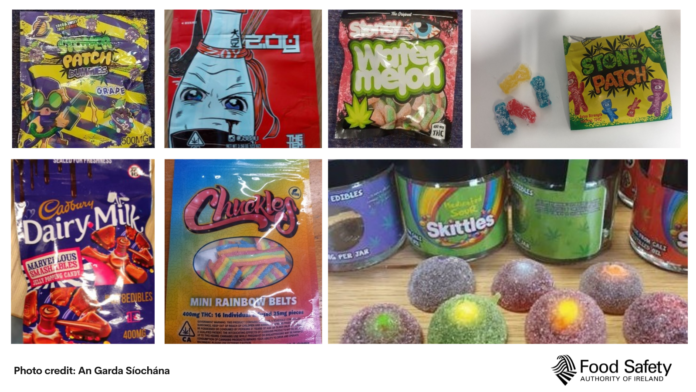The Food Safety Authority of Ireland (FSAI) is urging the public, especially parents and guardians to be extremely vigilant to the dangers of inadvertent consumption, particularly by children, of cannabis edibles, products such as jelly sweets containing the psychoactive cannabis component known as tetrahydrocannabinol (THC).
There is growing availability in Ireland of food products, in particular jelly sweets that contain significant amounts of the illicit narcotic drug THC. The FSAI issued this warning in advance of the Halloween festivities next week where small children, teenagers and adults will be celebrating and where there is an increased risk of people, particularly children, unwittingly consuming these types of products that are intentionally packaged to resemble popular brands of jellies in order to avoid detection.
This year to date, it has been reported that six children under the age of ten have been hospitalised having accidentally consumed THC-containing products which looked like normal jelly sweets.
Cannabis edibles are illegal food products containing THC and come in many forms, but primarily jelly sweets. THC is a controlled substance in Ireland with a zero tolerance under the Misuse of Drugs Act, 1977. Furthermore, in food, THC is considered a contaminant, with no permitted threshold in EU or Irish food law.
The FSAI states that the high concentrations (up to 50mg/jelly) of THC in these illicit edible sweets can pose serious health risks, particularly to teenagers and children of all ages whose neurological, physical and physiological development could be impacted negatively. Depending on the THC concentration, eating one of these jellies can mean ingesting a level of THC that is 5-10 times higher than that inhaled when smoking cannabis. The real concern is that children are not aware of the dangers and if they manage to gain access to a bag of these jellies, they will rarely eat just one and therefore, overdosing is a very likely outcome.
The prevalence of these edible products in communities and schools around the country is a growing cause for concern
Unlike the almost immediate effects from smoking cannabis, there is at least a thirty-minute time delay from consumption of cannabis edibles until the initial effects are felt. This poses a serious risk to those who have eaten these jellies who might mistakenly believe that they need to consume several jellies to feel an effect and then find they have overdosed when it is too late. Cannabis toxicity can cause cognitive and motor impairment and in the case of children this can be extreme, lasting up to 24 to 36 hours after consumption.
This call by the FSAI follows reports* of the first cases of paediatric cannabis poisoning in Ireland with six children, all under the age of ten, hospitalised after accidentally consuming these illegal jelly sweets. In addition, there have also been reports of teenagers falling seriously ill, and in some cases requiring hospitalisation after having seizures and becoming unconscious from overdosing on these cannabis edibles.
Dr Pamela Byrne, Chief Executive, FSAI says the accidental consumption of edible cannabis products by children is extremely worrying.
“We know adults and/or teenagers are ordering these illegal products from online or other illegal sources for their own personal use. However, they often have no understanding of the real health dangers of these products and are careless or reckless in putting young children’s health at risk by allowing them access to these products.
“The prevalence of these edible products containing THC in communities and schools around the country is a growing cause for concern and parents and guardians should be extra vigilant during festivities such as Halloween where parties will be underway, and the risk of accidental consumption of these products is considerably higher.”
“We are working closely with other Government agencies including the Health Service Executive’s Environmental Health Service and the Public Analyst’s Laboratory, Dublin; An Garda Síochana; Revenue’s Customs Service; Forensic Science Ireland; the State Laboratory and; the Food Standards Agency in Northern Ireland to detect and stop the import of these illegal food products into Ireland.
“We welcome any information from the public in the national effort to curb the availability of these illegal products and to protect our children and young people. We can be contacted through our online complaint form at www.fsai.ie/makeitbetter,” she added.



















